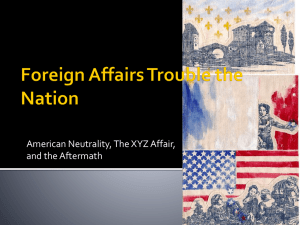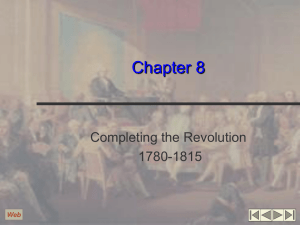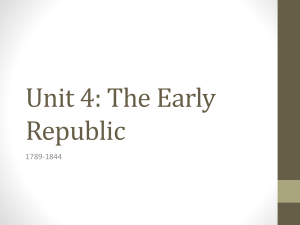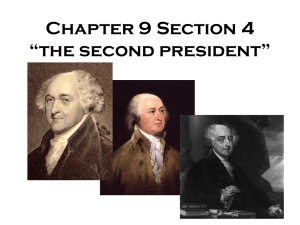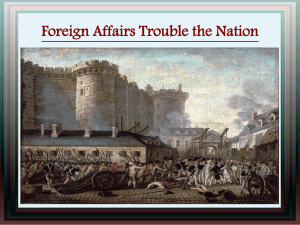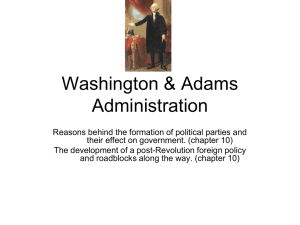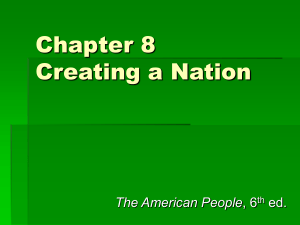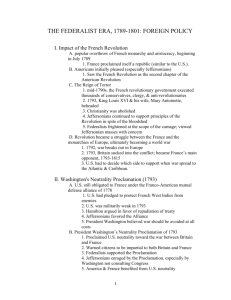Federalists
advertisement
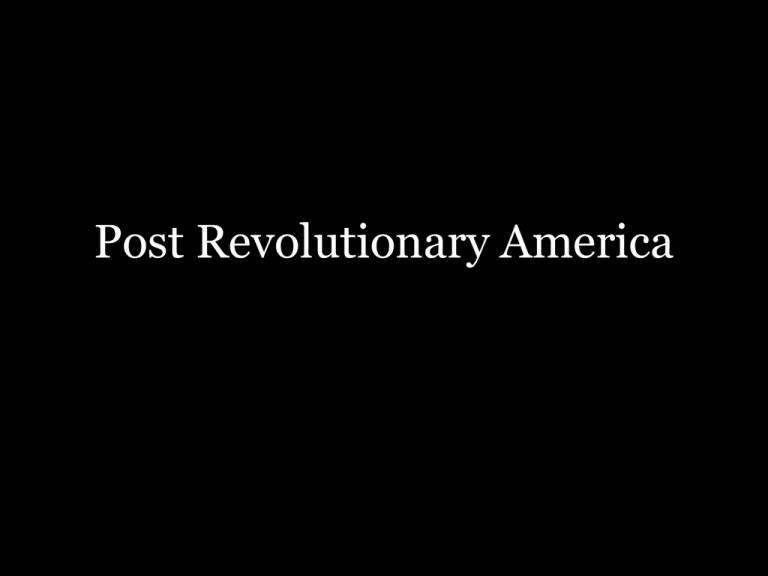
Post Revolutionary America Impact of Revolution External Internal • French Revolution • Abolition movements • End of the Church of England • Social law • Federalists v. Anti-Federalists • Presidential role • Checks/Balances • Funding • Land Federalists, Anti-Federalists, and Ratification CONSTITUTIONAL ISSUES New Issues • Ideas of the Constitution-what are they? • • • • • • Articles of Confederation-fix or new? Central v. decentralized government Democracy v. Republic National v. State Government Individual rights Tyranny Viewpoints Federalists • “Nationalists” • Supporters of Constitution • Strong central gov’t • Washington, Madison • Well funded, well organized, used print • Excessive democracy=a problem Anti-Federalists • Opposed ratification • Strong state gov’t • Supported farmers • Sam Adams, Patrick Henry • Too much government power=tyranny • Worried about tax • No protection of individual rights Ratification Process 4/9 states immediately approve (small) PA: dragged Anti-Feds to vote MA: torn over taxation By spring they had 9 to ratify; states still on the fence about accepting • VA accepts on a 89-79 vote • NY=most divided; Hamilton & Fed. Papers • NC and RI are the last to accept • • • • Federalist Papers • James Madison, A Hamilton, John Jay • 85 anonymous letters • 2 reasons to support: – Strong government to protect US in foreign affairs – Keeps local interest groups from dominating Executive Office • • • • • Most feared by Antifederalists How should it be run? By who? What qualifications? What if the President is no good? • Hamilton answers with Federalist Papers Constitution Accepted, Bill of Rights Approved… WHEN DOES REVOLUTION END? Washington, Adams, Jefferson FEDERALIST ERA 1789-1801 George Washington: Military • 1754-1783 • Grave, aloof, dignified • Well-equipped; discipline and personal example • Kept his army on the field • Respected civil liberty over martial law Washington: President • Founding Father • Privately feared weak central government • Federalist • Bare outline of duties • Chose his own cabinet • Set precedents 1st term, clouded 2nd term Washington: Cabinet • Cabinet: board of advisors • Desired to work WITH the Legislature, not against it • Secretary of State: Jefferson • Treasury: Hamilton Presidential Affairs Domestic Affairs • Inaugural Address • 1st Cabinet • Court System: Judiciary Act 1789 • Debt/1st National Bank • Whiskey Rebellion • Political Parties Foreign Affairs • French Revolution • British tensions – Jay’s Treaty • NEUTRALITY • Navy protection • Native Americans – Treaty of Greenville • Spain – Pinkney’s Treaty PRECEDENT (n) An event or action that is regarded as an example or guide to be considered in subsequent similar circumstances Domestic Affairs • Judiciary Act 1789 – Article III of Const. – "judicial power of the United States, shall be vested in one supreme Court, and such inferior Courts“ – Est. Supreme Court – Amendment 4 & 8 – Federal v. State courts • 1st National Bank Domestic/Foreign debts Rampant inflation State “IOU’s”=worthless Hamilton: Pay off state debts with security bonds – 1st Bank modeled off Eng – Paper money currency – Tariffs, Mercantilist policies, subsidies – – – – Opponents Whiskey Rebellion • 1791: first federal tax on domestic product • PA 1794: Farmers revolt; medium of exchange • How should the president respond? Washington Sets Precedent • Sends peace negotiators to talk with demonstrators • Backs PA governor to collect tax • Sends 13,000 Militia men to enforce • National Government can suppress resistance to its laws Pop Quiz! Explain the significance of each precedence set by President Washington: 1. Inaugural Address/Appearance 2. Judiciary Act of 1789 3. Cabinet 4. National Bank 5. Whiskey Rebellion Foreign Affairs: France • After the French help the Americans, they too have a revolution • Similar ideas, different outcomes • Background on French Revolution… • ~65,000 soldiers and sailors died in the American Revolutionary War • ~40,000 French citizens died during Reign of Terror • +Napoleonic Wars= easily over 1,000,000 people died in the French Revolution Relations with Europe • The French Revolution starts shortly after GW becomes President • Radicals in France kill the King and Queen, declare a revolution and declare war on British/Spanish monarchs • US trades with all countries • GW tries to maintain peace by declaring the US is, “Friendly and Impartial to both countries”- Neutrality Genet Affair • Edward Charles Genet • Sent by French to negotiate with US • Genet to encourages privateering of British ships • Congress debates on what to do with himGenet ignores government policies • Negotiate a way to send him home, power changes in France keeps him in US • British navy starts seizing neutral ships headed to French ports • Rumors; Native American attacks • GW sends John Jay to Great Britain to create a treaty and prevent a war Jay’s Treaty • New nation is not ready for a war again • Great Britain still seizes US ships headed to France • Great Britain will not reimburse US merchants who lost care to GB • US gets “most favored nation” status in trade with Great Britain • US gets rid of some of the British soldiers still in the Northwest Territory and opens ports Reaction to Jay’s Treaty • Senators think this treaty is awful, US gives up more than it gets • Senators still agree to sign this bill into law so they can avoid a war with Great Britain, try to keep it quiet (10 to 20 vote) • The American people find out about this treaty and are very unhappy, especially the Republicans (Jefferson) Pinckney’s Treaty • Thomas Pinckney from South Carolina • Spain joins France and Great Britain in war but Spain wants to keep peace with the US • Spain approaches the US about making a treaty-NEUTRALITY (seeing a pattern?) • Spain gives US access to Mississippi River and New Orleans, helping to soothe Western farmers • Native American chief Little Turtle forms Western Confederation of Native American groups • Little Turtle beats US troops in two embarrassing losses (1790-1791) • Washington sends massive amounts of troops, finally defeats Little Turtle (1794) at Battle of Fallen Timbers Greenville Treaty • 12 of the Native American groups from the Confederation sign the Greenville Treaty with the US • Native Americans agree to give up their land for $10,000 annually from the federal government • Settlers now feel safer to settle here Washington’s Farewell Address • Washington wrote a letter, addressed to the people of the United States, announcing he would not run again • Two main ideas – Stay away from Political Parties – Don’t get involved in the politics of other nations Goodbye George Election of 1796 • Federalist Candidate: John Adams • Republican Candidate: Thomas Jefferson • Electoral College-How do you decide? • John Adams Wins!! • Problems? Who is John Adams? Federalist party member Delegate from Mass. for CC European diplomat Vice President to Washington Married to Abigail Adams-intellectual woman who fought for women’s right • Son=6th President JQA • Vigorous foreign policy • • • • • Quasi War with France • French are upset by Jay’s Treaty, start seizing US ships headed to Great Britain • Federalists call for war with France • John Marshall, Charles Pinckney, and Elbridge Gerry go to France to negotiate in 1797 • They run into French Agents X, Y, an Z XYZ Affair • French Secret Agents (called X, Y, and Z) tell the US they must pay a bribe/loan before negotiations can begin • Quasi-War with France 1798 • Only war fought completely on the sea Quasi War • Convention of 1800: QuasiWar ends in 1800 • US gives up claims for reparations • France releases US from Treaty of 1778 Alien and Sedition Acts • The Quasi War causes domestic conflict • Federalists got US involved in the Quasi War; "MILLIONS FOR DEFENSE, BUT NOT ONE CENT FOR TRIBUTE" • Republicans upset-TJ • John Adams resents the statements Republican newspapers make about him • Pass 4 laws dealing with foreign policy Alien and Sedition Act 1. Naturalization: Immigrants must wait 14 years to become citizens (they usually voted Republican) 2. Alien Friends Act: Any immigrant could be deported without trial if deemed “dangerous to the peace” to the United States 3. Alien Enemies Act: Same as Friends Act except for males 14+ years from a hostile nation during a time of war 4.Sedition Act (tried to keep people from inciting rebellion) it is a federal crime to publish anything “false, scandalous, or malicious” about gov’t Is this Constitutional???? WHY OR WHY NOT? VA and KY say NO! • Response to Alien and Sedition Act: the Rep. controlled legislatures of VA and KY protest • Both states argue the A&S Act to be UNCONSTITUTIONAL • Madison with Virginia: public should oppose, universal alarm • Jefferson with Kentucky: states should be able to nullify unconstitutional fed. laws Nullification • Nullify: make of no use or value; cancel out; invalidate Virginia and Kentucky Resolutions • Virginia Resolutions argue interposition— States can place themselves between the people and the federal government to stop an illegal action of the government • Kentucky Resolutions argue nullification— States can declare an unconstitutional federal law to by invalid End Result? • Alien and Sedition Acts cause the election of Jefferson as next President • Alien FRIENDS act expires 1801, Sedition Act expires 1800 • Alien ENEMY act is kept…used during WWII for Japanese Internment camps • Adams retires to his home; Jeffersonian era begins

